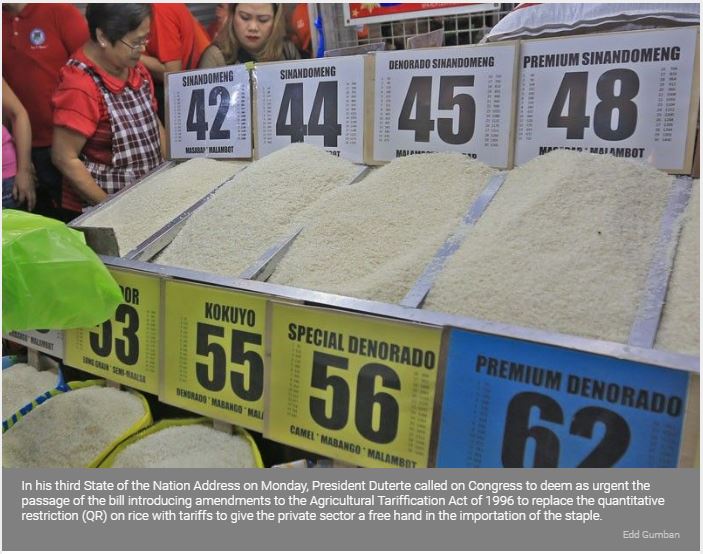Philippines: NEDA pushes early passage of rice tariff bill
Move seen to stabilize prices, temper inflation
MANILA, Philippines — The National Economic and Development Authority (NEDA) urged lawmakers yesterday to immediately pass the rice tariffication bill, stressing that easing rice importation can slash a percentage point off headline inflation which is expected to remain within the five percent level until the third quarter this year.
In his third State of the Nation Address on Monday, President Duterte called on Congress to deem as urgent the passage of the bill introducing amendments to the Agricultural Tariffication Act of 1996 to replace the quantitative restriction (QR) on rice with tariffs to give the private sector a free hand in the importation of the staple. This is seen to stabilize rice prices and address the artificial rice shortage in the country.
Duterte also warned of sanctions against “rice hoarders, cartels and their protectors,” saying he has directed intelligence and law enforcement agencies to uncover these entities so they will be prosecuted.
Socioeconomic Planning Secretary Ernesto Pernia said based on NEDA’s preliminary estimate, headline inflation rate would be reduced by one percentage point if the domestic wholesale market reduces its price to the level of imported rice.
“There is no time to waste. All of us must rally behind the administration’s reform agenda, most especially the rice tariffication bill, which if implemented will make our agriculture sector competitive in the long term,” he said.
Passing the bill into law would pave the way for the removal of the QR on rice imports and the imposition of the 35 percent tariff rate instead.
The QR on rice imports is a special privilege granted by the World Trade Organization (WTO), which has been extended three times since it was first imposed in 1995.
This entails restricting the volume of inbound rice shipments to 805,200 metric tons (MT) at 35 percent tariff. Imports outside of this minimum access volume (MAV) are levied higher tariffs.
The tariff revenues to be generated would be plowed back to the agriculture sector through the Rice Competitive Enhancement Fund (RCEF) to support projects that would modernize the rice industry and enhance its efficiency.
Part of the fund would be used to directly support rice farmers, especially those who would initially be displaced by the removal of the QR, to diversify into other economic activities.
NEDA also lauded the attention given during the President’s SONA on other priority measures pertaining to the country’s development agenda.
The include the Ease of Doing Business Law, the bill establishing the Coconut Farmers’ Trust Fund, the National Land Use Act (NALUA), the comprehensive tax reform, and a universal health care system.
The Ease of Doing Business Act signed into law last May 28 would enhance market competitiveness in the Philippines, said Pernia.
The creation of the Coconut Farmers and Industry Trust Fund, on the other hand, should exclusively benefit coconut farmers and farm workers, he said.
Pernia also reiterated the agency’s call for the passage of NALUA, which had been languishing in Congress for two decades. The proposed law aims to protect prime agricultural lands, to provide rationalized land use planning in the country, to consolidate national laws on land uses, and to address long-standing land use conflicts.
“We all share the President’s desire to protect the present and future generations. With the passage of NALUA, we ensure the sustainable use of the country’s land and physical resources,” Pernia said.
Source: https://www.philstar.com/business/2018/07/25/1836420/neda-pushes-early-passage-rice-tariff-bill#lZ5iRdTgb3vKSuKv.99


 Thailand
Thailand




